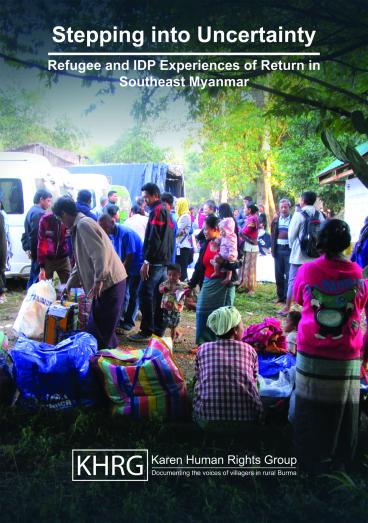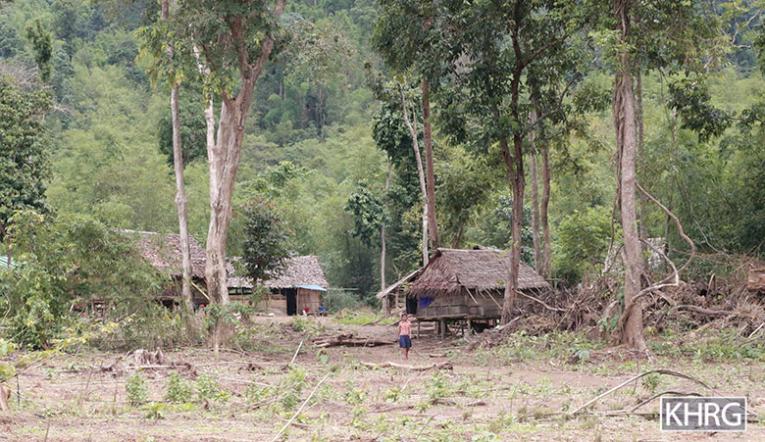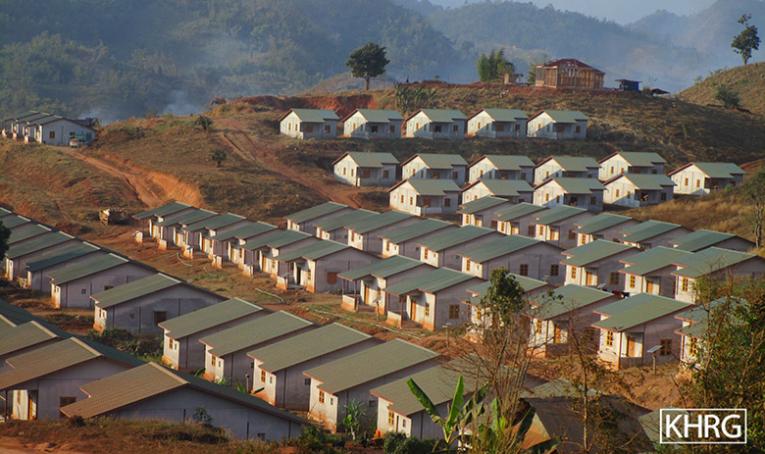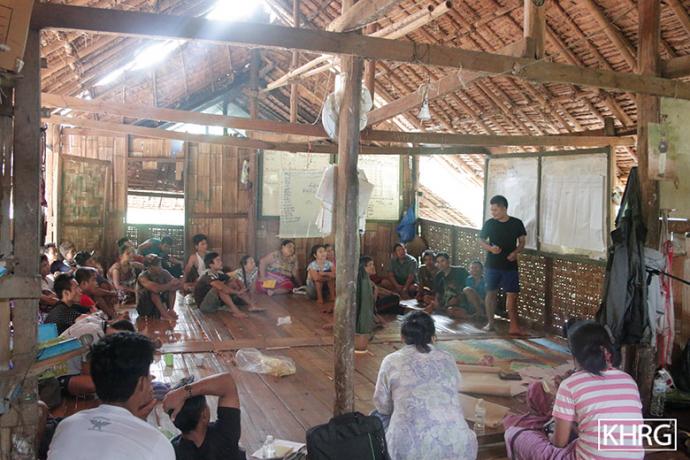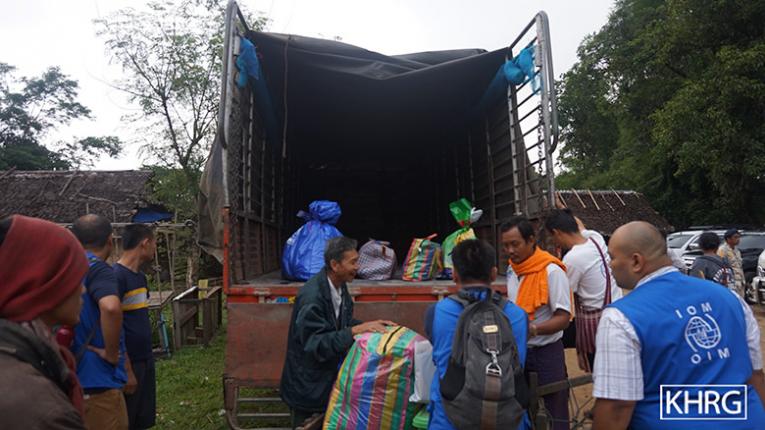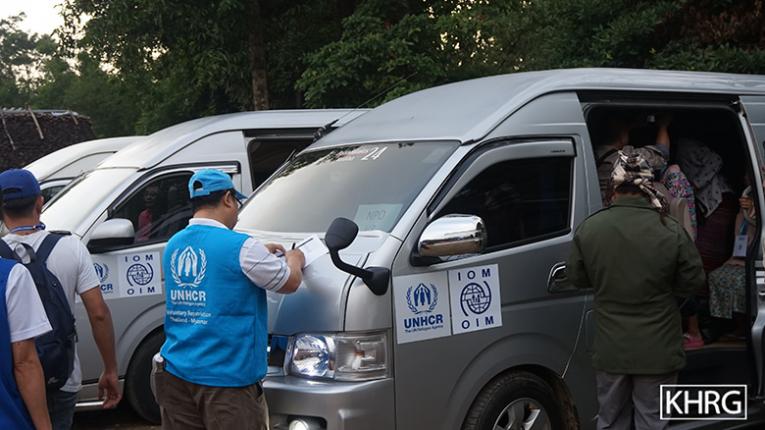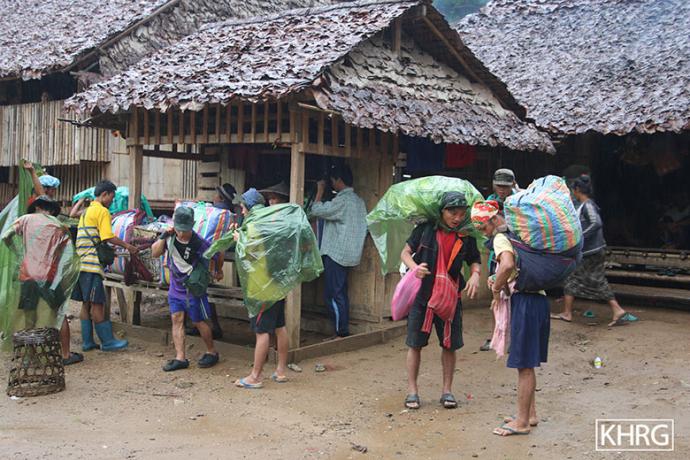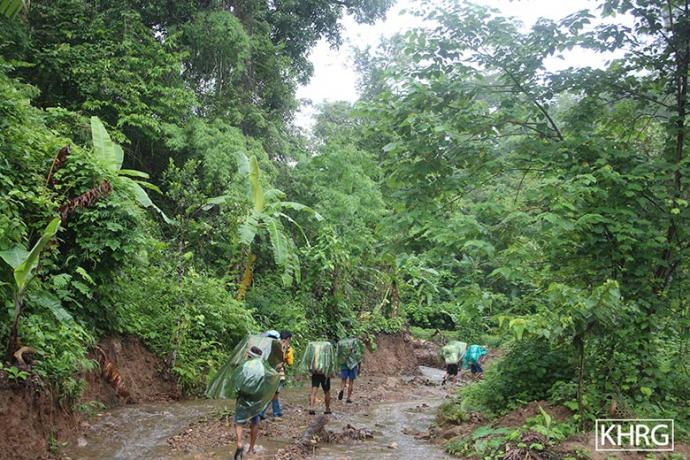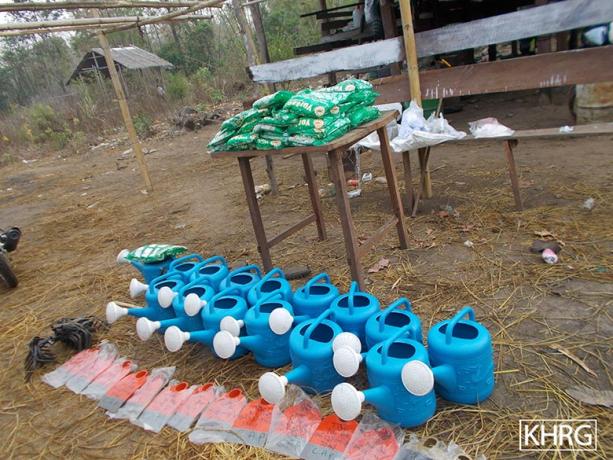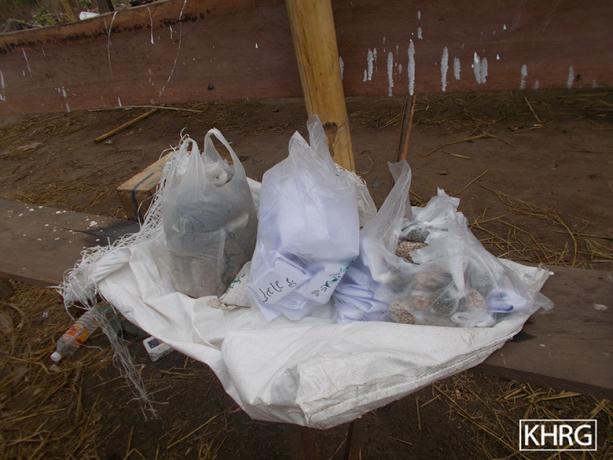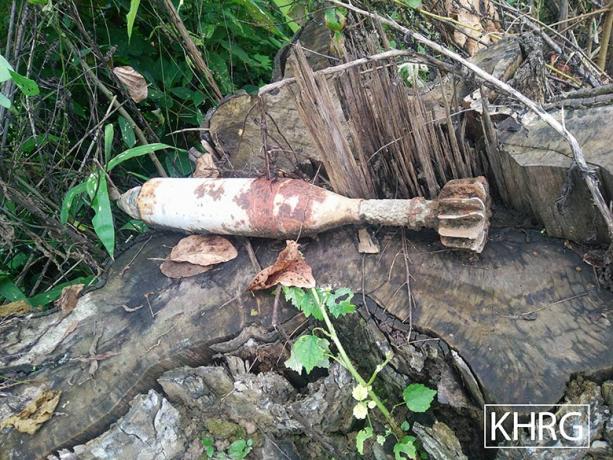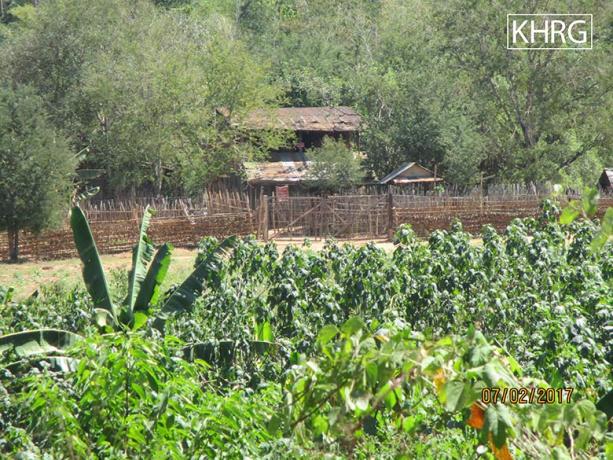Refugee repatriations and IDP returns in Myanmar have steadily increased since the 2015 Nationwide Ceasefire Agreement, as have repatriation and return initiatives. If ethnic minorities are to assume an active and equal role in Myanmar’s future, then political, economic and social reintegration of returnees is critical. The situation of refugee and IDP returnees in rural Southeast Myanmar remains however extremely difficult, with most struggling to meet their most basic needs and little means of even beginning to build a sustainable livelihood.
In June 2019, KHRG published a news bulletin on the situation of recently repatriated refugees in Mae La Way Ler Moo, Hpa-an District and Lay Hpa Htaw, Dooplaya District. The journey to their new homes was spent cramped in the back of dusty trucks, without enough food or water. A lack of basic social services, agricultural lands and income-generating opportunities awaited them on their arrival to resettlement sites. Most were repatriated to Myanmar in February 2019 as part of a voluntary process led by the Thai and Myanmar governments with the support of the UNHCR and other partner organisations. The UNHCR-facilitated repatriation that took place in February 2019 was only the third in what is expected to be an on-going initiative.
As future returnees could potentially face similar challenges as those described above, KHRG believed it paramount to identify the shortcomings of the repatriation initiatives that have been conducted thus far and provide recommendations to address them. This report is an attempt to provide a fuller analysis of the challenges faced by returnees than what was presented in the June 2019 news bulletin. To that end, it encompasses all categories of returnees, including refugees repatriating through the UNHCR, those who repatriated "spontaneously" (by their own means), along with IDP returnees.
Overview
KHRG interviews with returnees suggest that current support frameworks are so insufficient that those who do receive return assistance are generally no more capable of rebuilding their lives than those who have returned “spontaneously” with no institutional or governmental support whatsoever. Moreover, unmet promises about resettlement support and follow-up have left returnees vulnerable to further hardship, and even future displacement if they are unable to adequately rebuild their lives in their new localities. Ultimately, those who benefit from facilitated repatriation assistance live alongside other returnees, as well as local villagers and thus often face similar challenges, particularly after any initial support runs out.
Although some accommodation has been made to assist with access to legal documents, many returnees continue to struggle to obtain the documents to which they are entitled as citizens. As such, full political, social and economic inclusion will also be hampered, as access to land, education, and employment require civil documentation. Furthermore, interest in the upcoming national elections and local decision-making is extremely low, since the daily struggles to meet even their most basic needs remains the central preoccupation of most returnees. Concerns about security and safety are also still prevalent for some due to the presence of ethnic armed actors as well as landmines and UXO (unexploded ordnance). In the absence of economic and physical security, returnees are likely to remain marginalised as political and social actors in building a democratic, peaceful, and stable society.
Lack of confidence in the peace process, distrust in government administration, and feelings of being discounted by the current government were also expressed by returnees and serve as clear indicators that the historical realities of conflict and violence are not yet (but in need of) being addressed as part of repatriation and reintegration initiatives. By calling attention to these problems, the current report highlights the challenges faced by returnees so that actions can be taken to better promote their sustainable and dignified return. Throughout this report, KHRG privileges the lived experiences of return to amplify the concerns of returnees, whose voices should be taken into account by the Myanmar government and relevant ethnic armed organisations and aid providers.
Key Figures and Approach
A total of 1,039 refugees have returned to Myanmar under the UNHCR-led tripartite scheme: 71 in October 2016, 93 in May 2018, 565 in February 2019 and 310 in July 2019. Although this figure is set to increase in the near future, it pales in comparison to the number of displaced persons who choose informal forms of return. Despite the existence of official repatriation channels, information from The Border Consortium (TBC) suggests that most returns happen outside of these formal mechanisms. Over 18,000 refugees are estimated to have returned to Myanmar spontaneously (i.e., without UNHCR- or government-sponsored assistance) from 2012 to 2017, and a further 3,390 refugees in 2018.
The number of IDP returns has also increased in recent years. According to TBC, approximately 162,000 displaced persons attempted to either return to former villages or resettle in surrounding areas of Southeast Myanmar between 2013 and 2018. TBC noted, nevertheless, that the sustainability of these movements and prospects for reintegration remain in doubt due to on-going security and livelihood concerns. In fact, 11,000 of those 162,000 displaced persons were originally repatriated refugees, but were included by TBC in the above calculations because TBC believes that many of them may now be in a state of internal displacement due to difficulties with resettlement.
To highlight the situations faced by these three different types of returnees (facilitated, spontaneous, and internally displaced), KHRG chose to conduct interviews with IDPs and refugees in different locations of rural Southeast Myanmar. Altogether, KHRG interviewed 40 returnees (21 men and 19 women); and 4 local leaders (2 men and 2 women). The interviews were conducted in 20 villages spread across all seven districts within KHRG’s operation area.
The principles laid down in the UNHCR Handbook for Voluntary Repatriation (1996) and its Handbook for Repatriation and Reintegration Activities (2004) were then used to assess whether the conditions for successful reintegration were provided to returnees, and whether returnees feel that they are able to “secure the necessary political, economic, legal and social conditions to maintain their life, livelihood and dignity.”
The current sample of interviews does not match the global trends in return strategies for Southeast Myanmar. As previously mentioned, the vast majority of returns have been spontaneous, yet KHRG interviews were predominantly with those who returned through the UNHCR tripartite agreement. Because these returnees thave primarily been placed in large, accessible settlement areas, it is much easier to gather information from and bout this population. Given the constraints in identifying spontaneous returnees, both refugee and IDP, research will likely continue to underrepresented these returnees and fail to fully capture their experiences unless concerted effort is made in the future to access these populations.
Key Findings
Return experiences and return organisation
- Although some improvements in Thai procedures regarding the protection of refugees have been made in the past few years, legislation remains highly restrictive and few possibilities exist for displaced persons to find legal solutions to livelihood challenges besides repatriation to Myanmar. Return decisions for refugees are thus largely motivated by “push” factors: lack of freedom of movement and decreasing access to livelihood means in the Thai-Myanmar border camps. “Pull” factors, such as the hope of improving their situation, a desire to return “home,” and the possibility of having their own land to work on, were also cited but must then be considered in relation to the constraints felt in the camps and the actual situation most returnees have faced since their return.
Naw B---, who resided in Noh Poe camp for 13 years before repatriating back to C--- village in Dooplaya District in 2019, remarked: “We received less and less support in the refugee camp. […] The food aid is getting reduced. The other aid such as housing materials is getting reduced too.”
One returnee, who was in Ban Don Yang camp for approximately 15 years, sums up the situation as such: “Life was so restricted when we lived in the camp. We could not find ways to earn an income because we had to follow the camp rules. […] [W]e could not go out of the camp. It felt like we were under house arrest.” (Naw G---, Thoo Lei Plaw, Mergui-Tavoy District)
- Despite efforts on the part of UNHCR to improve the conditions of facilitated returns, the organisation of return travel in Myanmar continues to present a number of problems that affront the dignity of returnees and subject them to unsafe unhealthy travel conditions: disorganisation, unclean transportation, difficulty accessing food and water, and poor communication with the returnees often leaving them feeling mistreated.
- Travel conditions for those repatriating on their own could be difficult, both on the Thai side of the border and the Myanmar side. Travel arrangements were often complex undertakings that required negotiation and reliance on personal networks, particularly for long-distance returns.
For Naw G---, who returned to Tanintharyi Township in the far south of Myanmar, the trip was long and the transportation costs were high: “I had to pay many thousands of Thai baht to get it done. I paid one thousand [USD 32.31] to one driver and three thousand [USD 96.93] to the other. […] It took two weeks. We still had to rent a motorbike to reach here [Thoo Lei Plaw]. We were asked to pay 70,000 kyats [USD 50.75] but I begged the driver to reduce the cost because I didn’t have that amount of money.”
- IDPs generally undertake spontaneous returns, in large part because their status as IDPs prevents them from benefitting from facilitated repatriation initiatives under the jurisdiction of international protection organisations. Although IDP returns have been more spontaneous in nature, in a few KHrG interviews, IDPs noted that they were "encouraged" to return by village administrators and other local authorities.
- Although returns are typically categorised as either spontaneous or facilitated, the strategies actually employed by refugees and IDPs often combine a variety of elements. These strategies highlight both the agency of displaced populations in creating choice for themselves as well as certain weaknesses in the structure of current return facilitation programmes and their failure to fully address the essential needs of returnees.
“People who came back with me do nothing [have no jobs] so far. They just travel back and forth between the camp and here. There are some people who came back to get houses, and they are still registered in the camp [to get rations].”
(Daw S---, Htee Th'Bluh Hkee, Dooplaya District)
Support and reintegration assessment
- Due to an insufficiency of support and an absence of follow-up by protection and aid organisations, those who returned with assistance through the UNHCR tripartite agreement are generally not faring better than those who returned on their own. Even those who have returned to designated repatriation/resettlement sites, where access to basic services should have been assured by those organising their return, find themselves with limited access to clean water, healthcare and education. Some are even required to return to the temporary shelters in Thailand for basic medical care, and pay for schooling that is supposed to be free.
- Assistance from the Myanmar government, protection organisations like UNHCR, and local actors like the Karen National Union (KNU), Karen Women’s Organisation (KWO), Committee for Internally Displaced Karen People (CIDKP), Karen Office of Relief and Development (KORD), and Karen Environmental and Social Action Network (KESAN) remains extremely short-term, barely covering initial resettlement costs. Although returnees are promised six months of support, the amount provided translates in real terms to one or two months of support at best, and does not offer the means to purchase land or other provisions that make possible building a sustainable livelihood. Those who have been provided land, or were able to recuperate their land, are better positioned for successful reintegration, but still require outside assistance. Because of the fragility of their situation, many risk losing their lands or being unable to benefit from land ownership if not provided additional support.
“I can see that no one can stand on their own [feet] and secure their livelihood yet. They just came back with the little help they got from organisations before they returned here. They cannot work on their own yet. The support [they received] is not enough for them […]. The [KNU/KNLA-PC] leaders try their best to provide support, such as giving one sack of rice or less than that, as much as they can.” (KNU/KNLA-PC commander, Mae La Way Ler Moo, Hpa-an District)
- Many IDPs mentioned receiving small amounts of periodic material support from the KNU, as well as other organisations (particularly the CIDKP, KWO, and a few international NGOs). As with refugees who returned through UNHCR, IDPs returning from IDP camps were also concerned about the lack of continued support and follow-up that they received from the organisations that assisted with their return.
“We returned three years ago already, however, we have not seen any of them visit us yet. I just would like to highlight that their actions do not match their words [no implementation]. […] We were hopeful [to receive support from those organisations]. Later on, we had to accept that it might only be words because there has been no follow-up action for us.”
Naw Z---, Klay Hkee, Taw Oo (Toungoo) District
Citizenship rights and public participation
- Access to the rights of citizenship remains inadequate in all domains. Many returnees, even those who receive the assistance of UNHCR and its partners, struggle to obtain their legal documents because of extensive requirements and/or administrative impediments. In some cases, interviewees stated that they were only able to obtain their civil documents (ID and household registration) once they paid for them (even though these documents are supposed to be issued free of charge). IDPs in particular often lack (and cannot obtain) the documents required in order to apply for their national registration.
- Overall, there seems to be a lack of support to help returnees access justice and understand their citizenship rights, including the right to vote. Many expressed an overall distrust and lack of confidence in government administration, including doubts about being counted as full citizens.
One IDP who returned to Koh Nee village remarked that their voting choices are limited by the political structures that continue to exclude ethnic minorities and issues of concern to them: “Who do we have to vote for? We have experienced a lot of bad things from the Tatmadaw/Myanmar government. […] We will vote only for our ethnic leaders.” (Saw M---, Koh Nee village, Kler Lwee Htoo (Nyaunglebin) District)
Naw X---, who returned to Hkler Muh Khah village from Mae Ra Moe camp, added: “Even if we plan to vote, will they let us vote? I am not sure whether they will invite us or tell us to vote.”
- Discrimination against returnees by local villagers is a problem in some areas and risks creating further marginalisation.
Safety and security
- The guarantee of safety and security is a core condition of facilitating voluntary returns, which means that organised returns to certain areas are still not possible. The distribution of KHRG interviews reflects that problem. But even in areas considered “safe to return,” KHRG found that issues of security and safety continue to be a problem given the lack of any systematic demining operations in Karen areas. Landmine awareness training is provided to returnees, and is taking place in many areas of heavy resettlement, but landmines and UXO contamination are still present in certain locations, and thus pose a threat to villagers’ safety and can impact movement and livelihood.
In Hpa-an District, Naw An---, a refugee who returned to Mae La Way Ler Moo in February 2019, explained that there were UXO in the forest surrounding the village. She even witnessed an explosion when working on her fields: “We saw it when we cleared our fields. It even exploded when we burned our fields. […] People did not plant it, but shells were fired in the past. They fell in the forest, so when we burned our fields, it [a particular UXO] got burned and exploded.”
- The on-going presence of ethnic armed groups and military activity also leads returnees to worry about the return of conflict and feel distrust in the peace process.
“When I see the Tatmadaw showing up, I prepare my bag and gather my UNHCR ID card and all the other legal documents I have such as my Myanmar national ID card, my household documents and a torch light. [….] Sometimes I wonder: ‘Would we be accepted as refugees if we face displacement again?’ I thought that if we are not accepted as refugees again, we will show our UNHCR ID card and see if they change their mind. Because, you know… the situation in Myanmar is not stable. We cannot make promises for our future.” (Naw G---, Thoo Lei Plaw, Mergui-Tavoy District)
Conclusion
- The claims of repatriation initiatives to ensure the voluntary, safe and dignified return of displaced people and promote sustainable reintegration are not yet being fully met. The shortcomings of repatriation initiatives need to be addressed in order to ensure that future returnees, especially to rural areas, are provided not only adequate support, but also accurate information about the possibilities for sustainable reintegration.
“I started to realise that there are no guarantees for us in Burma. […] They should provide shelters [housing] for the returnees. They should ensure that education, healthcare and livelihood opportunities are already arranged in the repatriation sites before the refugees come back. They should provide protection and security for returnees.”
(Naw B---, C--- village, Dooplaya District)
- In parallel, initiatives to assess the scope of spontaneous refugee and IDP returns should be carried out by the Myanmar government and relevant stakeholders to identify the most pressing needs of informal returnees and help them rebuild their lives with dignity. A particular attention should be paid to mapping the organisations that already provide assistance and services to these returnees and to provide them with enough resources to support their operations.
Recommendations
General recommendations
- To the Myanmar Government, UNHCR, CBO-CSOs - Monitor the situation of UNHCR- and government-sponsored returnees; and conduct individual follow-up in cooperation with the local CBO-CSOs on a regular basis in order to identify the needs of returnees and provide them with adequate support.
- To the Myanmar Government, EAOs, UNHCR, donors – Conduct research to map return areas and assess the scope of spontaneous refugee and IDP returns; work in collaboration to identify spontaneous and IDP returnees’ most pressing needs and develop tailored assistance programmes to help them resettle and rebuild their lives.
- To the Myanmar Government, EAOs, UNHCR, donors - Identify the organisations that already provide assistance and services to returnees; provide them with the necessary access, and operational and financial support required to continue their activities.
Return
- To the Myanmar Government, UNHCR, donors, INGOs - Increase the provision of humanitarian assistance to refugees and IDPs still displaced in camps and temporary shelters, since the reduction of rations can be considered a form of coercion to return or resettle.
- To UNHCR, CBO-CSOs, INGOs - Continue working with the Thai government to create settlement opportunities and legal residence in Thailand for refugees who choose not to repatriate.
- To the Myanmar Government, UNHCR - Improve return travel conditions and assistance for returnees, including proper transport and adequate provision of food and water to UNHCR-repatriated refugees travelling to their repatriation areas.
Legal documentation
- To the Myanmar Government, UNHCR - Provide better coordination in assisting repatriated refugees’ access to legal documentation during the repatriation process, including support to finalise and obtain their documents in a timely manner once in their return areas.
- To the Myanmar Government - Ease the administrative requirements for the obtainment of civil documents, taking into consideration the specific constraints encountered by IDPs and refugees (i.e., name variations, inability to obtain certain supporting documents).
- To the Myanmar Government, INGOs - Facilitate the obtainment of legal documentation by providing support services for IDP and refugee returnees, as well as more inclusive ethnic language provisions for administrative services in rural communities.
Access to justice
- To the Anti-Corruption Commission of Myanmar - Step up the fight against corruption within the justice system to restore the trust of the population in the judiciary, including by setting up more local offices throughout the country and actively encouraging the reporting of instances of bribery.
- To the Myanmar Government - Allocate enough resources to support the expansion and activities of the Anti-Corruption Commission of Myanmar; and move forward with the adoption of a comprehensive Whistleblower Protection Bill to protect those who denounce instances of corruption.
- To the Myanmar Government, EAOs, CBO-CSOs - Conduct awareness workshops in returnee communities to promote a better understanding of human rights and the current justice systems in Southeast Myanmar; and facilitate recourse to legal mechanisms.
Civic participation
- To the Myanmar Government, CBO-CSOs - Provide voter education and raise awareness about the importance of citizen participation in the election process in returnee communities.
- To the Myanmar Government - Facilitate electoral registration in returnee communities ahead of the 2020 election, and set up enough polling stations to allow rural communities to exercise their right to vote.
- To the Myanmar Government, EAOs, CBO-CSOs - Promote the participation of women in local decision-making mechanisms, including through gender awareness workshops in return communities.
- To the Myanmar Government, EAOS - Develop mechanisms to monitor discriminations and protect returnees from discriminatory practices in their new communities.
Livelihoods
- To the Myanmar Government, EAOs, UNHCR, CBO-CSOs - Develop provisions for returnees to secure land and land titles, including through the direct allocation of land, financial and administrative support, land subsidies and/or the regulation of local land prices; and assist them in rehabilitating/preparing their lands to ensure their viability for agriculture.
- To the Myanmar Government, UNHCR, CBO-CSOs - Provide appropriate vocational training to help the returnees rebuild their livelihoods in rural areas.
- To the Myanmar Government, EAOs, CBO-CSOs, INGOs - Provide support to small-scale farming communities to help them access and establish agricultural markets, notably in return areas.
- To the Myanmar Government, EAOs, UNHCR - Create tailored assistance packages to cover the needs of the returnees until they are able to re-establish sustainable livelihoods.
Housing
- To the Myanmar Government, EAOs, UNHCR – Provide durable housing in repatriation areas for UNHCR returnees; and ensure that they have access to affordable, socially sustainable electricity, clean water and the necessary household items for reinstallation (i.e., bedding, kitchen items, mosquito nets).
- To the Myanmar Government EAOs, donors, INGOs, Put in place due diligence measures to prevent the awarding of contracts to companies with military links for the construction of housing in repatriation sites.
- To the Myanmar Government - Improve access to clean water and affordable, socially sustainable electricity, and develop and encourage adapted waste management systems in the rural areas of Southeast Myanmar, notably in return communities.
- To the Myanmar Government, EAOs, CBO-CSOs - Support refugees who returned spontaneously and former IDPs by helping them rehabilitate or build durable housing.
Education and healthcare
- To the Myanmar Government, EAOs - Improve overall access to education and healthcare in the rural areas of Southeast Myanmar, including through the construction and staffing of new schools and clinics.
- To the Myanmar Government, UNHCR - Ensure that education and healthcare facilities are available within a reasonable distance of designated repatriation sites and are staffed to meet the increasing needs of these settlement areas.
- To the Myanmar Government - Develop mechanisms to monitor curriculum differences between education in the camps and education in government schools, and that support pedagogical continuity for returnees.
- To the Myanmar Government - Facilitate access to government schools for the children of IDPs and refugees who returned spontaneously, and provide equivalency support for those who did not attend government schools.
Physical security
- To the Myanmar Government, Tatmadaw, EAOs - Ban the continued use of landmines, mark all areas contaminated by landmines and unexploded ordnance (UXO), and inform the local communities of their location for their safety.
- To UNHCR, CBO-CSOs - Continue promoting and carrying out Mine Risk Education activities in return communities, IDP camps in Myanmar and temporary shelters in Thailand.
- To the Myanmar Government, EAOs, UNHCR - Ensure that there is no landmine or UXO contamination in the immediate vicinity of designated repatriation sites.
- To the Myanmar Government, Tatmadaw - Demilitarise areas close to repatriation sites, villages and livelihood areas by removing existing troops and dismantling army camps; and ceasing patrols in or near civilian areas.

